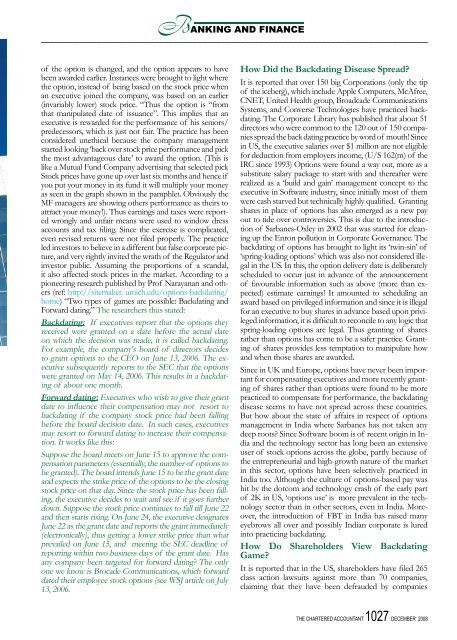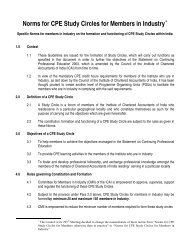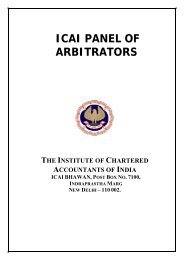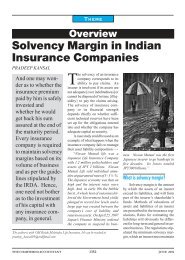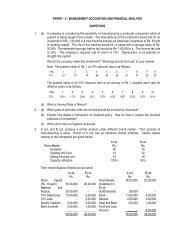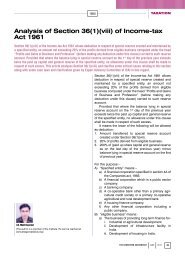The Chartered Accountant
The Chartered Accountant
The Chartered Accountant
Create successful ePaper yourself
Turn your PDF publications into a flip-book with our unique Google optimized e-Paper software.
of the option is changed, and the option appears to have<br />
been awarded earlier. Instances were brought to light where<br />
the option, instead of being based on the stock price when<br />
an executive joined the company, was based on an earlier<br />
(invariably lower) stock price. “Thus the option is “from<br />
that manipulated date of issuance”. This implies that an<br />
executive is rewarded for the performance of his seniors/<br />
predecessors, which is just not fair. <strong>The</strong> practice has been<br />
considered unethical because the company management<br />
started looking ‘back over stock price performance and pick<br />
the most advantageous date’ to award the option. (This is<br />
like a Mutual Fund Company advertising that selected pick<br />
Stock prices have gone up over last six months and hence if<br />
you put your money in its fund it will multiply your money<br />
as seen in the graph shown in the pamphlet. Obviously the<br />
MF managers are showing others performance as theirs to<br />
attract your money!). Thus earnings and taxes were reported<br />
wrongly and unfair means were used to window dress<br />
accounts and tax filing. Since the exercise is complicated,<br />
even revised returns were not filed properly. <strong>The</strong> practice<br />
led investors to believe in a different but false corporate picture,<br />
and very rightly invited the wrath of the Regulator and<br />
investor public. Assuming the proportions of a scandal,<br />
it also affected stock prices in the market. According to a<br />
pioneering research published by Prof Narayanan and others<br />
(ref: http://sitemaker. umich.edu/options-backdating/<br />
home) “Two types of games are possible: Backdating and<br />
Forward dating.” <strong>The</strong> researchers thus stated:<br />
Backdating: If executives report that the options they<br />
received were granted on a date before the actual date<br />
on which the decision was made, it is called backdating.<br />
For example, the company's board of directors decides<br />
to grant options to the CEO on June 13, 2006. <strong>The</strong> executive<br />
subsequently reports to the SEC that the options<br />
were granted on May 14, 2006. This results in a backdating<br />
of about one month.<br />
Forward dating: Executives who wish to give their grant<br />
date to influence their compensation may not resort to<br />
backdating if the company stock price had been falling<br />
before the board decision date. In such cases, executives<br />
may resort to forward dating to increase their compensation.<br />
It works like this:<br />
Suppose the board meets on June 15 to approve the compensation<br />
parameters (essentially, the number of options to<br />
be granted). <strong>The</strong> board intends June 15 to be the grant date<br />
and expects the strike price of the options to be the closing<br />
stock price on that day. Since the stock price has been falling,<br />
the executive decides to wait and see if it goes further<br />
down. Suppose the stock price continues to fall till June 22<br />
and then starts rising. On June 24, the executive designates<br />
June 22 as the grant date and reports the grant immediately<br />
(electronically), thus getting a lower strike price than what<br />
prevailed on June 15, and meeting the SEC deadline of<br />
reporting within two business days of the grant date. Has<br />
any company been targeted for forward dating? <strong>The</strong> only<br />
one we know is Brocade Communications, which forward<br />
dated their employee stock options (see WSJ article on July<br />
13, 2006.<br />
BANKING AND FINANCE<br />
How Did the Backdating Disease Spread?<br />
It is reported that over 150 big Corporations (only the tip<br />
of the iceberg), which include Apple Computers, McAfree,<br />
CNET, United Health group, Broadcade Communications<br />
Systems, and Converse Technologies have practiced backdating.<br />
<strong>The</strong> Corporate Library has published that about 51<br />
directors who were common to the 120 out of 150 companies<br />
spread the back dating practice by word of mouth! Since<br />
in US, the executive salaries over $1 million are not eligible<br />
for deduction from employers income, (U/S 162(m) of the<br />
IRC since 1993) Options were found a way out, more as a<br />
substitute salary package to start with and thereafter were<br />
realized as a ‘build and gain’ management concept to the<br />
executive in Software industry, since initially most of them<br />
were cash starved but technically highly qualified. Granting<br />
shares in place of options has also emerged as a new pay<br />
out to tide over controversies. This is due to the introduction<br />
of Sarbanes-Oxley in 2002 that was started for cleaning<br />
up the Enron pollution in Corporate Governance. <strong>The</strong><br />
backdating of options has brought to light its ‘twin-sin’ of<br />
‘spring-loading options’ which was also not considered illegal<br />
in the US. In this, the option delivery date is deliberately<br />
scheduled to occur just in advance of the announcement<br />
of favourable information such as above (more than expected)<br />
estimate earnings! It amounted to scheduling an<br />
award based on privileged information and since it is illegal<br />
for an executive to buy shares in advance based upon privileged<br />
information, it is difficult to reconcile to any logic that<br />
spring-loading options are legal. Thus granting of shares<br />
rather than options has come to be a safer practice. Granting<br />
of shares provides less temptation to manipulate how<br />
and when those shares are awarded.<br />
Since in UK and Europe, options have never been important<br />
for compensating executives and more recently granting<br />
of shares rather than options were found to be more<br />
practiced to compensate for performance, the backdating<br />
disease seems to have not spread across these countries.<br />
But how about the state of affairs in respect of options<br />
management in India where Sarbanes has not taken any<br />
deep roots? Since Software boom is of recent origin in India<br />
and the technology sector has long been an extensive<br />
user of stock options across the globe, partly because of<br />
the entrepreneurial and high-growth nature of the market<br />
in this sector, options have been selectively practiced in<br />
India too. Although the culture of options-based pay was<br />
hit by the dotcom and technology crash of the early part<br />
of 2K in US, ‘options use’ is more prevalent in the technology<br />
sector than in other sectors, even in India. Moreover,<br />
the introduction of FBT in India has raised many<br />
eyebrows all over and possibly Indian corporate is lured<br />
into practicing backdating.<br />
How Do Shareholders View Backdating<br />
Game?<br />
It is reported that in the US, shareholders have filed 265<br />
class action lawsuits against more than 70 companies,<br />
claiming that they have been defrauded by companies<br />
THE CHARTERED ACCOUNTANT 1027 DECEMBER 2008


